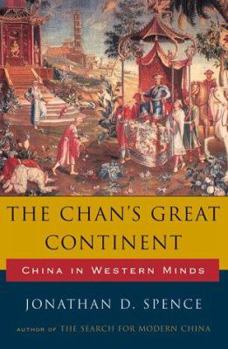The Chan's Great Continent: China in Western Minds
Select Format
Select Condition 
Book Overview
China has transfixed the West since the earliest contacts between these civilizations. With his characteristic elegance and insight, Jonathan Spence explores how the West has understood China over... This description may be from another edition of this product.
Format:Hardcover
Language:English
ISBN:0393027473
ISBN13:9780393027471
Release Date:January 1998
Publisher:W. W. Norton & Company
Length:279 Pages
Weight:1.40 lbs.
Dimensions:1.1" x 6.5" x 9.6"
Customer Reviews
5 ratings
A curious fish
Published by Thriftbooks.com User , 21 years ago
~This is an odd book, one of those curious fish that escape the nets of genre. Is is history? Sort of. Literary Criticism? Perhaps. Cultural anthropology? In a way.It's well worth reading, but it's not an entirely successful book. In a way Spence's great virtue is his downfall here. He's too generous and open a reader, too ready to take the Western traders, soldiers, missionaries, and men of letters on their own terms. He'll follow them anywhere -- and the result is a rather unfocused phantasmagoria, a bewildering palimpsest of Chinas. One of Spence's main points is that the Chinas in Western minds have no necessary connection to each other, or to the "real" China -- and it's a point well-taken -- but the result is a diffuse and slightly out-of-focus book. It's history in the strict sense, when it intriguingly evaluates Marco Polo's credibility. It's history in the 19th Century vein (that's praise, in my book) when it presents the tragedy of an isolated missionary's wife betrayed to an unmerited violent death in the Boxer rebellion. It's cultural anthropology when it evaluates Mark Twain's simultaneous racism and anti-racism. It's pure literary criticism as it meditates on Kafka, Malraux, and Borges. It's very good in each mode. But the different modes don't really inform and enrich each other. The book remains a collection of disparate pieces, each very good of its own kind, but it never reaches the higher unity that we look for (maybe unfairly, maybe unwisely) in a cross-disciplinary book.Still it is a great read, and its sheer variety (and the display of Spence's remarkable virtuosity) is entrancing. It may be disorienting, but it's never boring. Anyone whose fate makes them one of that other species of curious fish -- those who swim in between the East and West, being wholly of neither the one nor the other -- will want to read it.
When A Chinese read this book in Chinese version...
Published by Thriftbooks.com User , 22 years ago
It's great! Although some historic characters I want to see didn't show up, I still enjoy reading it.Seeing how western people though about our culture hundred of years ago makes me laugh. Maybe you westerns would laugh, too. If you know how we Chinese thought of you long time ago...
When Chinese read this book in Chinese version...
Published by Thriftbooks.com User , 22 years ago
I think that it's great! Though some characters I whant to know dont show up in this book, I still enjoy reading it.Seeing how western people thought about Chinese hundred of yaers ago made me laugh. And I believe that you would also laugh, if you know how Chinese thought of your culture long time ago...
Not Really a History of China
Published by Thriftbooks.com User , 23 years ago
The subtitle of this book is clear. THE CHAN'S GREAT CONTINENT: CHINA IN WESTERN MINDS is not a history of China. It is a history of Western thinking, using "China" as a mirror. Sometimes, the image distorts the subject, but its not China we are looking at. As an expatriate living in Korea, who is daily confronted with the distortions and limitations of my own western thinking, the concept of an "Asia" or "China" is more dangerous and loaded than all the jingoistic slogans ad agencies produce.Each chapter is a look at some (or many) pieces of literature or criticism, making the whole book more literary criticism than history (the nod to Harold Bloom should be a big clue to this). So many major and minor works are examined, that it is clear, that "China" could never be so much to so many, even over time. What is documented here, is the Western need for dualism and aggrandiazement at the expense of an "other".The book is actually better-written than it should be, like William James. It should be dry and abtuse, like some bad literary criticism. Spence's skill as a popular writer makes the exposition too slick. This is a specialist work masquerading as popular history.If read correctly, this book should shock and humble. After all, why do Westerners find so much that is different in "China"? Why are there conclusions so off-mark? This book is not a history of China, but a history of Western errors.
Excellent
Published by Thriftbooks.com User , 24 years ago
The work is a fascinating studying of how one culture misunderstands and bends another's reality to its own dreams, fantasies, etc. Compare to 'Prisoners of Shangrila'. Now if somebody could write a study of China's awesome misunderstanding of the West, we'd be on to some communication. Note: For reviewer Zhu Yuan Zhang, the reason /Chan/ appears in the title of the book is that that is the old transliteration of the Mongol /Qan/ (< [Turkic] Qaghan) or 'Emperor'. Chinggis Khan, Qinghis Qan, etc. It was the Mongol Empire which first smashed both China and Kievan Rus' to create a Eurasian empire. You can figure out the rest.






